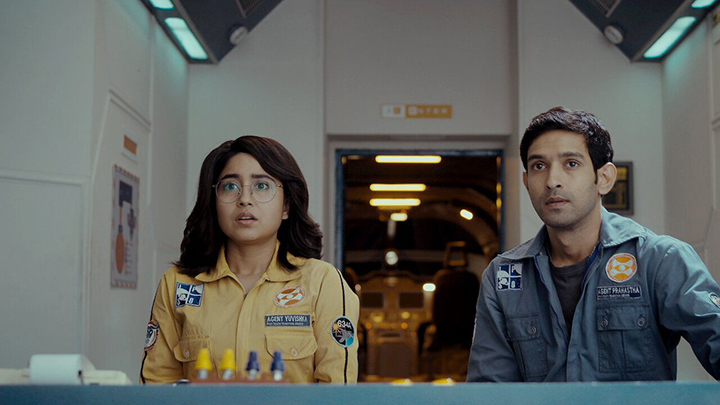Netflix’s Cargo is a fresh and promising attempt at the less explored sci-fi genre in Hindi cinema
The recently released Netflix film Cargo has a unique plot. The story revolves around ‘post-death transition services’. The 113-minute film quenches one’s curiosity about the afterlife, blending myth with science — and takes its audience on a journey via spaceship ‘Pushpak 634A’.
Cargo was featured in the MAMI Film Festival back in 2019 under the spotlight section. The film got its digital release on Netflix on September 9. Written and directed by Arati Kadav, the film explores the journey of souls — who are to be recycled and readied for rebirth. Men and women, one by one, arrive on the spaceship referred to as Cargo. A few electrocuted, others stabbed in the back, some victims of accidents are welcomed by a man in an astronaut suit on Pushpak 634As.
The man in an astronaut suit — the reclusive demon, Prahastha (Vikrant Massey), is known for doing his job well, and a peace treaty is signed between humans and demons. The story is based on childhood stories about ‘karma’, which eventually decides one’s destination after death.
Interestingly, in the film, people find themselves on Pushpak 634-A after death. Once they arrive on this huge spaceship, all the belongings that one had with them at the time of death are discarded; even their memory is erased. Hence, they are healed and prepared for reincarnation. Surprisingly, they are attended upon by demon agents aka live people, humans.
The film stars Vikrant Massey and Shweta Tripathi (Yuvishka) in the lead roles alongside other prominent actors like Konkana Sen Sharma, Nandu Madha, Biswapiti Sarkar, Anjum Rajabali, Hansal Mehta among other cast members.
Prahastha leads a lonely and monotonous life on the ship for almost a decade and this monotony becomes a part of his being as well as the theme of the film. During the long period of his stay on the ship, he has met and cured so many dead people but never engaged with them. But things change when he meets the juxtaposition to his personality Yuvishka Shekhar (Shweta Tripathi), a lively girl, who joins him on the ship as an assistant.
At a time when the world is in the midst of a pandemic, where we all are experiencing existential crises in life, one can easily relate to the film as it questions the purpose of life. As the story unfolds, Prahastha’s desperation to not let go of his only human companion Yuvishka becomes evident. He does not want to lose his humanitarian base and go back to the monotonous life. Yuvishka’s character has a sensitivity towards life, death, and people. Her character is the most relatable in the film, which connects to the audience.
In her debut as a writer-director, Kadav has done a great job. Though the prominent share of the story remains with Massey and Tripathi, the cast played a brilliant role in making their presence felt in their own ways. The film efficiently presents the crippling sense of isolation not only through the protagonists but also through the large and empty space in the shots and scenes.
Cargo bursts the bubble of illusion about permanence. It asks you questions and confronts you with the uncomfortable truths. As Yuvishka asked in the film, ‘When we all have to die, why do we have stories?’ The film gives hope that the cycle of life and death will continue; memories will fade, heal and start again.
The plot might sound absurd to some, but it has a fresh storyline, which has been presented on-screen with utmost simplicity and perfection. At the onset of her career, director Arati Kadav has played with a genre of Bollywood which is still sort of new to Hindi cinema – that is, sci-fi.
Despite being a low-budget sci-fi film, Cargo has made its mark and created an impact. The film has so far travelled over 25 film festivals (explaining its theatrical/digital delay release), including the South by Southwest Film Festival (SXSW) and Mumbai Film Festival (MAMI). The film has received a generous response and favourable reviews from various sections of the industry.
Talking to a leading newspaper, director Kadav said, “Science fiction is perceived as an expensive genre. I didn’t want it to be a copy of a Hollywood film. Kaushal Shah [DOP] and I had a specific vision. What you don’t have in money, you compensate in colours and a rich visual vocabulary. A lot of credit goes to production designer Mayur Sharma.” Referring to its retro sci-fi look, she added, “Touch-screens are boring. The spaceship had to be an organism.”
Sci-fi in Hindi Cinema
The 1952 release Kaadu (The Jungle) marked the beginning of the first sci-fi film in India. The film was a Tamil-American co-production featuring an expedition to find the cause of the strange behaviour of animals. After that, a number of films in Hindi and regional languages have been made with a sci-fi touch in their storyline.
Coming back to the commercial Hindi films, one can refer to the 1964 release Mr.X In Bombay directed by Shantilal Soni. The film is considered as a classic starring Kishore Kumar, Kum Kum, and Madan Puri. Bollywood has explored sci-fi concepts from time to time with films like Mr India (1987), Toofan (1989), Koi Mil Gaya (2003), Taarzan: The Wonder Car (2004), Krrish (2006) among many others.
Mostly, sci-fi films are limited to the storyline and superhero approach to the lead role. Not very recent but PK(2014) has explored a different approach to the sci-fi genre and the very recent web series JL 50 has also gone in a different direction as the series explores the complex idea of time-travel. In the same light, Cargo stands out with its unique concept — breathing, contracting and lengthening like the movements of a jellyfish.




